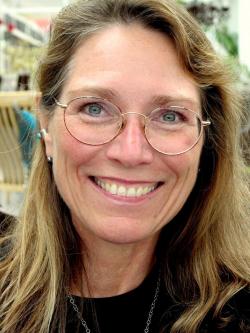Award to Brigham-Grette recognizes career-long achievements
Professor Julie Brigham-Grette, geosciences, has been honored by Germany’s Alexander von Humboldt Foundation with one of its coveted Humboldt Research Awards, which will support her research collaborations there over the coming six months. 
The award committee says the honor “is conferred in recognition of the award winner’s entire academic record to date. In addition, award winners are invited to carry out research projects of their own choice in cooperation with specialist colleagues in Germany. We hope that thereby the international scientific cooperation will be further promoted.” The Humboldt award is given to 100 winners annually and supports researchers for up to one year on long-term research with specialist colleagues at a German research institution. It is valued at €60,000.
Brigham-Grette says of the honor, “I appreciate the wonderful opportunity to continue to develop my research collaborations, and I look forward to working in a different environment because that can be exciting in its own way.”
She plans to spend several months at the University of Cologne while on sabbatical developing new research projects with her long-time collaborator Martin Melles and others to build on their joint achievements with the Arctic scientific drilling program they completed in Siberia in 2009.
That year, Brigham-Grette, Melles and colleagues spent six months collecting sediment from the bottom of frozen Lake El’gygytgyn, where they retrieved the longest core samples ever collected on land in the Arctic. At the time they said the data was “of absolutely unprecedented significance” in reconstructing the region’s geologic climate record. Cores they collected under the lake are more than 30 times longer than records from the Greenland Ice Sheet, for example.
Brigham-Grette explains that while in Germany, “I’ll be planning new projects in developing paleoclimate records in Alaska that could be used for understanding circumarctic climate change. This includes understanding past intervals when sea ice extent was lower due to changes in Earth’s orbit around the sun.” These changes simulate the intensity of climate change caused now by humans, notably increases in greenhouse gases, she adds.
The Arctic paleoclimate expert, who is chair of the U.S. National Academy of Sciences’ Polar Research Board, says she, Melles and colleagues in Russia and Austria have been continuously publishing findings over the past decade based on the Lake E data, and they expect to continue with more. Brigham-Grette says the team recovered more than 1,100 feet of sediment reaching back roughly 3.6 million years. The team recovered roughly 131 feet of the earliest history of the lake in the warm middle Pliocene. This interval is fascinating, she adds, as a possible analog for future climate due to carbon dioxide “forcing,” which can trigger the greenhouse effect.